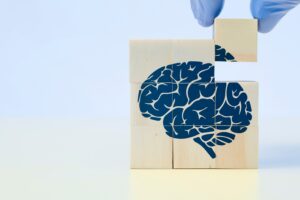
New Study Reveals How Depression Rewires the Brain to Favor Negative Experiences
Scientists have uncovered a crucial mechanism by which depression alters brain function, especially in its emotional processing center, the amygdala. This pioneering study reveals that depression intensifies the brain’s response to negative stimuli while dampening responses to positive ones, leading to a “negativity bias.” This discovery, spearheaded by a team from Institut Pasteur and CNRS (French National Centre for Scientific Research), opens promising avenues for targeted treatments for patients resistant to conventional antidepressants.

Inside the Study: Breaking Down Depression’s Impact on the Brain
The study, published in Translational Psychiatry in September 2024, was led by scientists from the Institut Pasteur and the French National Centre for Scientific Research (CNRS). The research team included psychiatrists from Paris Psychiatry and Neurosciences University Hospital Group (GHU), Inserm, and the CEA. Key contributors to this study were Mariana Alonso, head of the Emotional Circuits Group at Institut Pasteur, and Chantal Henry, a Professor of Psychiatry at Université de Paris.
How Was the Study Conducted?
According to Neuroscience News, this investigation examined changes in the brain during depression by focusing on the amygdala—a region central to processing emotions and reactions to external stimuli. The researchers used a mouse model that exhibited behaviors and reactions analogous to those of depressed individuals, including heightened anxiety, reduced grooming behaviors, and a preference for dark environments. The amygdala activity was then recorded to observe differences in how depressive states impact the encoding of positive and negative stimuli.
To understand depression’s neural impact, researchers measured the activity of specific neurons involved in the processing of olfactory (scent-based) stimuli. These included pleasant smells and aversive odors, such as predator scents. Unlike previous studies, which hadn’t directly observed these neural circuits during depressive episodes, this research focused on the real-time impact of depressive states on the amygdala.
Prior research established a link between depression and a general negativity bias, but the precise neural mechanisms were still not fully understood. The amygdala’s role in emotional processing and its involvement in negative emotional experiences has been documented, yet this study is one of the first to explore how these circuits change during depressive episodes, focusing specifically on sensory processing. While earlier studies have identified neural abnormalities in depression, this study’s direct examination of the amygdala’s altered functioning in real time represents a novel advancement.
What Makes This Study Groundbreaking?
This study is innovative in its precise focus on how depression reshapes the amygdala’s response to stimuli, leading to a stronger reaction to negative stimuli while dampening positive experiences. Key innovations include:
- Direct Observation of Amygdala Circuits: The study sheds light on specific neural pathways involved in depression, mapping out which neurons become more or less active during depressive episodes.
- Mouse Models Replicating Human Depression: By using mouse behaviors that closely mimic human depressive symptoms, the researchers created a model to test targeted neural responses.
- Real-Time Analysis of Neural Response: Unlike past studies relying on broad or generalized brain imaging, this research measured the activity of neurons involved in encoding positive versus negative stimuli in real-time.
- Potential for New Therapeutic Pathways: The findings suggest potential treatments that focus on reactivating neural circuits encoding positive experiences, offering hope for patients resistant to traditional antidepressants.
Key Conclusions of the Study
The study’s findings provide new insight into how depression alters neural circuits and offers promising directions for future treatments. Here are the main takeaways:
- Reduced Activity in Positive-Processing Neurons. Depression significantly dampens the activity of neurons in the amygdala that respond to positive stimuli, decreasing the individual’s ability to experience pleasure or positive emotions.
- Increased Activity in Negative-Processing Neurons. In contrast, neurons that respond to negative stimuli are overactivated, reinforcing a negative emotional bias that drives depressive symptoms.
- Negativity Bias in Depressive States. Depression leads to a negativity bias where the brain prioritizes negative information over positive, making neutral or positive experiences seem less impactful.
- Possibility of Reversing Negative Bias. By stimulating positive-encoding neurons in the mice, researchers could partially reverse depressive behaviors, suggesting that modifying these circuits might reduce depressive symptoms in humans as well.
- Pathways for Treatment-Resistant Depression. Findings indicate that therapies targeting amygdala circuitry could be beneficial for individuals who don’t respond to standard antidepressants, potentially paving the way for innovative treatments.
Why This Matters: Implications for Medicine, Society, and Beyond
Understanding Depression’s Neurological Roots
With depression affecting between 15% and 20% of people globally at some point in their lives, this study’s insights are critical to improving treatments and potentially reducing the prevalence of depression. The research emphasizes the amygdala’s crucial role in generating emotional responses, highlighting how depressive episodes can skew our perceptions toward negativity.
Targeting the “Negativity Bias” for New Treatments
For those who do not respond well to antidepressants, which include nearly 30% of people with depression, these findings offer hope. The possibility of modifying amygdala circuitry, especially by boosting the positive-response pathways, provides a new therapeutic angle. Treatments that can correct the imbalance in how stimuli are perceived might help reduce symptoms and improve life quality for those with severe or chronic depression.
Potential for Broader Applications
The significance of this study extends beyond just depression. The identification of specific circuits within the amygdala that influence positive and negative perceptions could aid in treating other mood disorders, including bipolar disorder, where patients experience extreme shifts in mood. Understanding these circuits may also help in the broader context of mental health, as therapeutic methods targeting perception biases could improve resilience to stress and emotional hardship.
Educational and Societal Awareness
For educators and advocates of mental health awareness, these findings present a valuable opportunity to foster understanding about the physical changes in the brain associated with depression. By highlighting the neurological underpinnings of depression’s negativity bias, this research can help reduce stigma, making it easier for individuals to seek help and for society to support those in need.
Depression’s Impact on Cognitive Abilities
Depression affects not only emotional processing but also cognitive abilities. Research shows that depressive states are linked to impaired concentration, reduced decision-making capacity, memory issues, and slower thinking processes. Depression can diminish information-processing abilities, making everyday tasks challenging and reducing productivity at work or in school. This is further complicated by the negativity bias, as the brain focuses on negative aspects, which distracts from tasks and hinders task completion. The gradual restoration of positive neural circuits, as suggested by the study, could not only reduce emotional symptoms of depression but also help improve cognitive functions.
Conclusion: Hope on the Horizon
This study by Institut Pasteur and its collaborators opens new doors in the quest to understand and treat depression. By pinpointing the specific neural changes that foster a negativity bias, the research provides a compelling basis for novel therapies that could transform how we approach depression and mood disorders. As scientists work to verify these findings in human studies, the promise of treatments tailored to correct depressive brain patterns offers renewed hope for individuals struggling with treatment-resistant depression.













